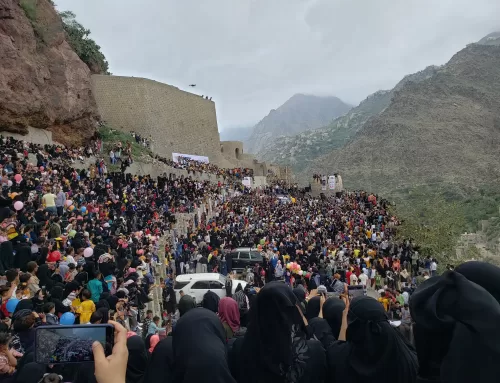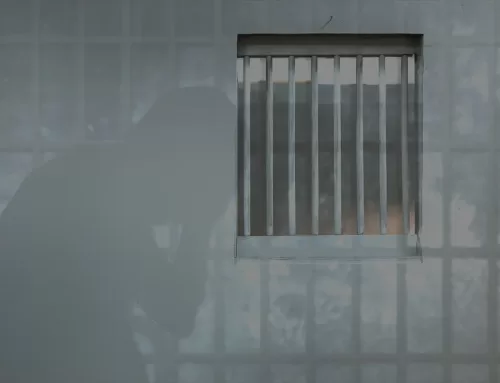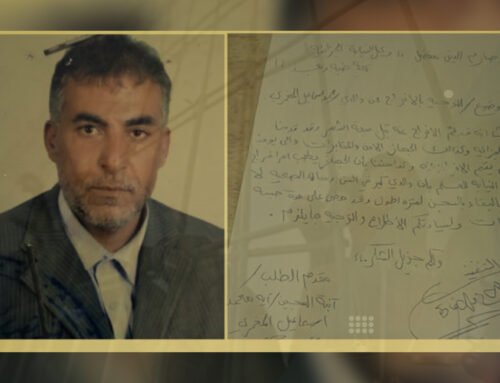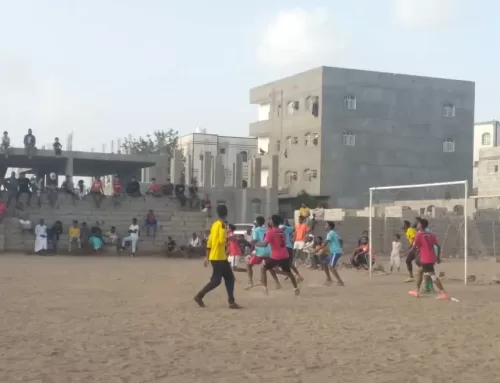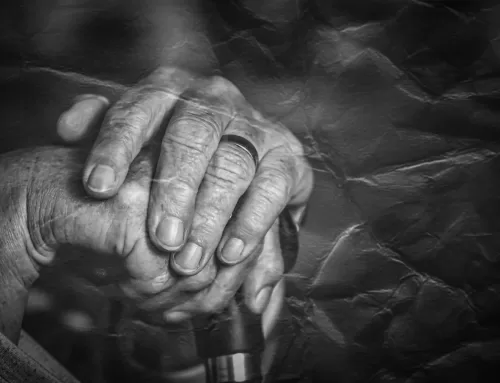Let us do justice to Abdullah al-Aghbari’s life by putting an end to torture and holding those responsible for it accountable.
Much controversy has recently surrounded the role of civil society organizations in advocating the case of the young Abdullah al-Aghbari, who was killed in a heinous torture incident, the details of which indicate that it is of a criminal nature, and how to support the course of justice and redress.
This controversy is not the result of this moment, particularly with the existence of a targeted media machine that will invest in the miseries of the Yemenis to fuel and exacerbate the war. Therefore, there is a deliberate confusion between human rights and the political and criminal fields and between what is private and public. However, it is also important for Mwatana organization to convey objectively its voice to the Yemeni people (civilians), as we aim through our work to put pressure on all the violating parties to stop undermining the lives of these civilians and their interests. The legitimate question that people should ask is: “What is the role of human rights organizations in such incidents?”
Since the torture incident occurred within the geographical scope of the Ansar Allah group (Houthis)’s control, its authorities are called upon firstly to amend their behavior in arbitrary detention, enforced disappearance and torture, and secondly to review their repressive practices against Yemeni civilians in their prisons and places of detention, so that crime does not become the general context of a society that might behave similarly to the group.
Observing the course of events in the case of the killing of the young Abdullah al-Aghbari, which was referred to the competent authorities, does not in any way mean a lack of solidarity with the victim and a feeling of loss, as we saw him being crushed by a brutal torture machine, operated by a group of human wolves. In parallel, it is also important to mobilize all of our voices in order to monitor the parties to the war, which have been committing the crime of torture for more than five years and without any accountability. In the al-Aghbari case in particular, the responsibility of human rights organizations is to follow up on the progress of the procedures to ensure that there is no distortion of the course of the case and prevents achieving justice for al-Aghbari and his grieving family.
Since the torture incident occurred within the geographical scope of the Ansar Allah group (Houthis)’s control, its authorities are called upon firstly to amend their behavior in arbitrary detention, enforced disappearance and torture, and secondly to review their repressive practices against Yemeni civilians in their prisons and places of detention, so that crime does not become the general context of a society that might behave similarly to the group.
The internationally recognized Yemeni government and the Southern Transitional Council compete with Ansar Allah (Houthis), as torture is widespread in the areas under their authority. It is more appropriate for the competition to be in the degree of these sides’ respect of human rights, rather than the competition for which side is the worst. Until now, it has been proven that torture in Yemen is one practice adopted by multiple parties.
With our keenness in Mwatana for Human Rights to follow up on the legal procedures of the al-Aghbari case to enable both parties to the case to attain their legal rights, it should be noted that what was raised during the past few days did not deviate much from our human rights demands that we have always repeated in the literature of our work and its outcomes – torture is a heinous crime that should not be tolerated. Those who practice it must stop immediately.
Therefore, it is very important to take advantage of the popular movement in this regard, to recall the hundreds of incidents that Mwatana has documented, and which contain a number of torture practices, including those that lead to death in a systematic manner.
People did not have access to live recordings of these practices, but this does not mean that what is practiced inside the basements, prisons and cells is less ugly and sadistic than what we have seen, if not more than that, to an unimaginable degree. These victims are also waiting for us to take a firm stance and highlight these cases once again to put an end to their suffering and the suffering of their loved ones, and to put an end to such atrocities.
Our work lately has been, and still is, trying to depict the victimization of civilians that the parties to the conflict try to hide. As long as we are all working to detect this disdain for civilians and their lives, we can bring our camera back closer in order to catch a glimpse of what these parties are practicing. It is an opportunity to remind them of their violations so that they learn that the Yemenis are fed up, and none of these actions is ever acceptable.
In its report “In the Darkness” issued in June 2020, Mwatana documented different methods of torture used by the parties to the conflict and the various authorities in Yemen in their official and unofficial prisons. The torture methods documented by Mwatana, including detention centers mentioned in this blog, also encompassed nail removal, severe beatings, electric shocks, not allowing detainees to be exposed to sunlight, not providing adequate rations of food and drinking water, preventing medical care, hanging by the hands, and confiscating clothing.
The documented methods of torture included as well taking detainees into the yard at night during winter, lack of ventilation or lighting, the use of electric drills, forced stripping, threats of rape or rape of relatives, sleep deprivation, the use of loudspeakers to make noise, hanging upside down and the denial of performing religious rites.
According to testimonies documented by Mwatana, detainees were subjected to sexual assault, burns in their genitals, humiliating searches, intimidation with the use of dogs, injection of unknown substances, prohibited use of toilets, prevention from communicating with their relatives, kicking, whipping, burns with cigarette butts, insertion of iron bars in the anus, forceful drinking of urine, and burning with cigarette butts.
In its report “In the Darkness” issued in June 2020, Mwatana Organization for Human Rights investigated at least 32 incidents of torture in the security and intelligence apparatus, “the former national and political security services” run by the “Ansar Allah” group (Sanaa) in the capital Sanaa.
A former detainee told “Mwatana” that there is a section called “The Western Wing” that is known as “The Disappearing Section”, in which some detainees are isolated and prevented from mixing with the rest of their counterparts, so that news of their detention does not leak to their families.
In Waddah Hall, which is managed by the UAE-backed Transitional Council and was used as an unofficial detention center until the beginning of the year 2020, “Mwatana” verified no less than 18 incidents of torture, and two deaths were reported in the detention place in Waddah Hall, during the period from May 2016 until April 2020.
According to the testimonies of other detainees, at least three detainees contracted cholera and died in detention without being treated or receiving medical care. “Mwatana” documented incidents of torture of detainees in “Waddah Hall” prison, where the detainees were handcuffed and then stoned.
In the city of Al-Saleh, north of Taiz, which the “Ansar Allah” group (Houthis) controls, Mwatana investigated at least 4 incidents of torture and two deaths in the place of detention, during the period from May 2016 until April 2020.
“Mwatana” learned that at least one detention room is called the “pressure cooker”, which is a room in the basement of a building, with an area of 3 x 2 meters, completely closed without lighting, and 4 to 12 detainees are kept in it without a toilet.
During long periods between 2016 and 2019, the Detention Administration withheld information about the fate of the detainees in Al-Saleh city and did not allow them to communicate with their families.
“Mwatana” learned that at least one victim died in Al-Saleh city due to his deteriorating health and lack of access to any medical care.
In the Al-Jala camp affiliated with the UAE-backed Transitional Council, Mwatana investigated no less than 17 incidents of torture in Al-Jala camp, during the period from May 2016 to April 2020.
Former detainees told “Mwatana” that the basement in which they were held was extremely damp and hot, without any ventilation and lighting, and that detainees were subjected to torture in different ways.
In the coalition camp in Al Buraiqeh, Aden, which is affiliated with the coalition led by Saudi Arabia and the UAE, Mwatana verified at least 8 incidents of torture in the coalition camp, during the period from May 2016 to April 2020.
In this place, between 7 and 21 detainees were held in containers of goods. Emirati officers and soldiers investigated the detainees in the coalition camp. Former detainees reported that the conditioning in those containers is a form of torture, as detainees were subjected to very low temperatures.
The detainees’ families told Mwatana that they could not communicate with their detained children, and that the Political Security Department refused to respond to the release warrants, including those issued by the Ministry of Interior and the Public Prosecution.
Mwatana verified 4 incidents of torture and 3 deaths in the place of detention in the political security department in Ma’rib, which is run by government forces affiliated with the Al-Islah party, during the period from May 2016 to April 2020.
Former detainees told “Mwatana” that the place of detention is located in a basement without any ventilation, and that the Political Security Department in Ma’rib uses the “Al-Saleh” Institute as a remand center when the security prison is full. Mwatana documented incidents of torture that occurred in it.
The detainees’ families told Mwatana that they could not communicate with their detained children, and that the Political Security Department refused to respond to the release warrants, including those issued by the Ministry of Interior and the Public Prosecution.
As for the Security and Intelligence Services, formerly “the national and political security apparatus”, in the city of Al-Hudaydah, which is run by the “Ansar Allah” group (Houthis), Mwatana verified no less than 7 incidents of torture that took place in the period from May 2016 to April 2020.
In the Community College, Dhamar, in which the “Ansar Allah” group (Houthis) uses some of its buildings as an unofficial detention center, “Mwatana” verified no less than two incidents of torture and a death in the place of detention during the period from May 2016 to April 2020.
Their eyes were blindfolded, and their hands and feet were tied all the time in dark cells without lighting. They were prevented from using the toilets
Mwatana interviewed former detainees, who reported that the conditions of detention were extremely poor and inadequate to the requirements of a healthy living, and that infectious diseases spread among the detainees, such as tuberculosis and scabies.
In Al-Rayyan prison, which is run by the Saudi-Emirati-led coalition and the Hadrami Elite Forces of the Southern Transitional Council, Mwatana investigated no fewer than 10 incidents during the period from May 2016 to April 2020.
A former detainee explained to “Mwatana” their conditions during their detention. Their eyes were blindfolded, and their hands and feet were tied all the time in dark cells without lighting. They were prevented from using the toilets, and they were forced to prostrate to the Emirati flag.
In the October 14 prison, which is run by the security belt of the Southern Transitional Council supported by the UAE, Mwatana investigated at least 29 incidents of torture and 4 deaths in the place of detention in the October 7 prison, during the period from May 2016 to April 2020.
In other cases, detainees were placed in concrete pools with very cold water at night and forced to remain in them until they lost consciousness. Mwatana also documented incidents of torture of a sexual nature, and other incidents of death in the place of detention resulting from torture. The bodies of detainees were dumped in the courtyard of the Al-Razi Hospital, Ja’ar, Khanfir District.
In the “former national and political security apparatus” in Ibb, which is run by the “Ansar Allah” group (Houthis), Mwatana verified no less than 5 incidents of torture during the period from May 2016 to April 2020.
Former detainees told “Mwatana” that they were subjected to torture and other forms of ill-treatment in isolation rooms, such as beatings with whips, rifle hands, and electric shocks.
All parties to the conflict and the various authorities must immediately cease the use of torture, and they must remember that such violations are not subject to a statute of limitations.


